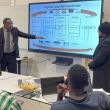Global Value Chains as the vehicle for economic and social development
From 30 January – 03 February 2023, professionals from different parts of the world came together at MSM in Maastricht to join the 5-day short executive programmes Value Chain Analysis for Business Development and Local Value Addition. The programme focuses on how developing economies can benefit from global and regional value chains.
According to Ms. Anita Darientarita from Indonesia, joining the programme has been an insightful experience: “I have learned about the network of firms that bring products or services to the market. They consist of the flows of goods, investments, services, know-how, people, and digital information involved in production and marketing.”
The main reason why Mr. Myat Khaung Linn from Myanmar applied for the programme is because of a project he is currently working on: “I am working with the European Forest Institute (EFI) to connect Myanmar wood-based enterprises to the global markets. The programme gave me a lot of support for my work because the lectures and interactive discussions increased my knowledge and gave me new ideas to apply.”
One of the main advantages of The Value Chain Analysis programme is the practical oriented approach, enabling the participants to put the newly gained knowledge and skills directly into practice as soon as they are back home. For Mr. Rogers Kanamina from Uganda this particular set up of the programme was of great value: “The course has enabled me to understand the main drivers of global value chain development and I can now apply this knowledge to analyse the competitive position of the industrial sector in the global economy.”
Ms. Darientarita fully agrees with the words of Mr. Kanamina: “The newly gained knowledge will be used for better improvement of my organisation on the network involved in the production of our products and services, including our organisation’s facilitators and in our respective institutional environments.“
Also Mr. Khaung Linn benefited from the practical oriented approach: “I had the opportunity to learn not only theory but also practical concepts from the programme's lecturers and guest lecturers. My favorite thing is the experience of putting theory into practice through classwork, group assignment, and case study exercises.”
The learning environment of MSM’s Value Chain Analysis programme consists of professionals from various countries with different professional backgrounds. According to Mr. Kanamina this gives an extra dimension to the programme: “I had the chance to interact with students from different countries and they shared different ideas and knowledge about their countries economic development.”
From all the insights Ms. Darientarita gained during the programma, she could identify one major take-away: “I am now able to discover and understand opportunities and constraints to the improvement of companies or organisations or industry sectors. Both opportunities and constraints are in the supply chain, in the marketing, or in the operations of businesses, and involve private-private and public-private relationships.”
About the Value Chain Analysis for Business Development and Local Value Addition programme
Global Value Chains (GVC) are the network vehicles through which most of international trade takes place. GVC adds value, creates employment and offers effective opportunities for achieving higher levels of sustainability in the economy. Insertion into these GVCs is, especially for low economy countries, a condition for development. Dr. Jeroen van Wijk, Associate Professor Global Value Chain and Partnerships at MSM, has designed this short executive programme to educate participants on how developing economies can benefit from global and regional value chains. During the programme, three inter-related aspects are highlighted: (a) Strategies for particularly small and medium-sized enterprises (SMEs) to participate in global and regional value chains; (b) Policies for governments and business support organisations to help SMEs insert themselves into such chains; and (c) Opportunities for governments and civil society organisations to promote green and inclusive value chains.
Would you like to join the Value Chain Analysis programme as well?
The next programme will take place from 29 January - 02 February 2024. Click here for more information about the programme and how to apply.
About MSM’s Short Executive Programmes
Today’s rapidly changing societies and economies demand the most from organisations, leaders, managers and professionals. MSM’s Short Executive Programmes for emerging markets are developed to achieve a successful and sustainable transformation of both individuals and organisations to support local economic development and business management.
Related news
The role and responsibility of businesses in a globalised world: Corporate Social Responsibility
Implementing effective strategies to stimulaten women Entrepreneurship
Striving for Gender Equality and Women Empowerment of all women and girls

